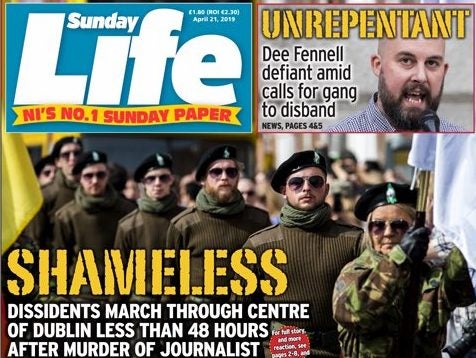
The UK’s largest press regulator has said that advisories sent to media outlets advising them not to contact specific parties do not act as a blanket ban.
The Independent Press Standards Organisation made the remarks as it dismissed a complaint made under Clause 3 (harassment) of the Editors’ Code of Practice.
The complaint was made by John Gordon over a Sunday Life article headlined “Eviction Row boss provides security for Feile” published on 23 December last year.
Gordon, the owner of a private security firm in Northern Ireland, carried out a controversial eviction that month in Roscommon, in the Republic of Ireland.
Following the eviction Gordon and his staff were reportedly attacked by 20 armed people in an attempt to reclaim the property, with a number of needing hospital treatment as a result.
Footage of the incident was widely circulated and the attack widely reported.
Gordon contacted IPSO which circulated an advisory notice stating neither he nor his family wished to comment on the incident and asking the press to stay away from his home.
The following day a journalist acting on behalf of Sunday Life contacted Gordon by email at his business, which he claimed was in breach of the code as it came following a request for media to desist.
In the email the reporter asked Gordon to confirm his company had been subcontracted to work at high-profile events and if he had made companies employing his firm aware it was being investigated by the Republic of Ireland’s Private Security Authority.
The email acknowledged the IPSO advisory but said given the nature of the story there was a public interest in giving Gordon a chance to respond.
Sunday Life denied any breach of the Editors’ Code, saying the incident in Roscommon was widely reported and that therefore there was a public interest in reporting the fact that the complainant’s business, which was under investigation by Irish authorities, had provided security at high-profile events and was linked to well-known companies.
Sunday Life said this was a new story and the advisory only related to the incident in Roscommon.
However, it had contacted IPSO to seek advice before contacting the complainant and said that caution had been taken – pointing to the fact the journalist had contacted Gordon by email rather than visiting his home or phoning him.
IPSO said: “Private advisory notices act as a general request to desist, notifying several publications at once that an individual does not wish to be contacted by the media in relation to a particular story.
“An approach by a journalist after such a notice has been issued may constitute a failure to respect a request to desist, in breach of clause three.
“However, the notices do not act as blanket bans on all contact from journalists or prohibit the printing of future stories about a subject.”
The committee noted the contact was made regarding new claims and that Sunday Life had not asked for a comment on the eviction incident.
It added that it was important Gordon was given an opportunity to respond, and that due to the approach being through a polite email any intrusion was limited.
The regulator found there was therefore no breach of the Editors’ Code.
Read the full IPSO ruling here.
Email pged@pressgazette.co.uk to point out mistakes, provide story tips or send in a letter for publication on our "Letters Page" blog

